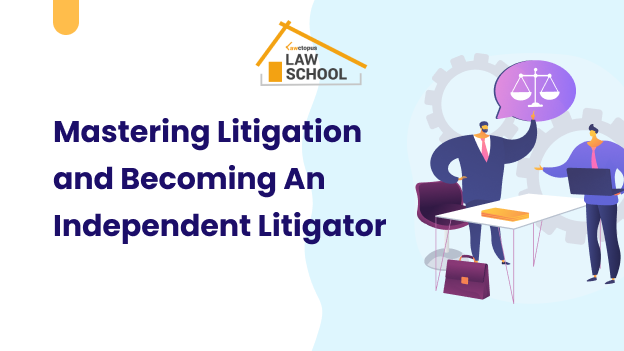Skip this if the idea of starting your own practice and growing as a litigator doesn’t keep you up at night!
But if it does, you’re in the right place!
These 45 live sessions led by litigation experts, will empower you with the right research and drafting skills to practice in both the civil and criminal side!
You will also get an opportunity to connect with experienced civil and criminal advocates who will guide you in starting your own practice and train you to handle new cases and grow your practice!
Whether you are a 1st generation lawyer who’s interested in starting an independent practice or someone who comes from a family of lawyers and is looking to expand their practice, you’ll find this course of value.
Click here to register for the 6-Month Long Expert Level Course on Becoming an Independent Litigator: Rs. 21,900
About the 6-Month Long Course on ‘Mastering Litigation and Becoming An Independent Litigator’
This course is designed to make your journey of becoming an independent litigator comfortable and highly rewarding for you!
By the end of this course, you will master the essential research and drafting techniques for civil and criminal litigation while also learning the step-by-step process for setting up your own chamber, attracting clients, expanding your practice, and maintaining a strong client base.
In addition to technical skills, the course offers monthly sessions on argumentation techniques to sharpen your courtroom presence. These sessions, led by experienced litigators, will teach you how to present your case persuasively and effectively!
So, what is holding you back?
Take control of your career now!
Course Fee
The value of the offerings in this course is Rs. 50,000/-
Course: 6-Month Long Expert-Level Course on ‘Become an Independent Litigator’: Rs. 21,900/-
About Lawctopus Law School
Lawctopus Law School has taught a wide range of practical skills to over 17,000+ law students, young lawyers, professionals, academicians, and business people. Over 1000 students have rated our courses and the average rating is 93/100. Our online courses are ‘warm’ learning experiences!
At LLS, our courses are developed by subject matter experts (practitioners and academicians) and these courses are a mix of
- Rigorously researched reading modules
- Recorded lectures by Industry Experts
- Weekly live sessions for clearing of doubts
- Practical assignments which mirror real-life assignments, with personal feedback
- Special Modules, Add-on career webinars, and
- The now famous ‘warmth and care’ of LLS
How will this course help you?
- Law students will gain the skills to excel in litigation internships and understand the career path to follow after graduation.
- Litigating lawyers with 0-6 years of experience will learn how to establish and sustain their own practice.
- Master the drafting of essential documents for successful civil and criminal practice.
- Improve your argumentation skills, enabling you to present your cases more effectively in court.
- Learn to network more efficiently within the legal community.
- This course will save you 3-5 years of your legal career by teaching you in just six months what typically takes that long for a lawyer to learn to become independent. We will guide you through every step, filling the knowledge gap and ensuring you grasp the basics while gaining ample experience in understanding court procedures and drafting!
- You’ll learn the procedure and drafting of essential documents required in civil and criminal litigation, including drafting of legal notices, plaints, written statements, evidence affidavits, FIRs, complaints, charge sheets, bail applications, appeals, writs, PILs, and much more!
Structure of this Course
Summary box – Month wise points (2 to 4 points)
Month 1 – Introduction to Litigation Basics
Module 1 – Introduction
- Level of preparedness of an Advocate in a Courtroom
- Arrangement of case files
Module 2 – Courtroom 101
- Basics of functioning of a Courtroom
- Various stages of court proceedings (both civil and criminal cases).
- The right nomenclature to be used for parties in litigation.
- Usage of the E-Courts Websites to check case status, previous orders, cause lists
Module 2 A – Introduction to Case Files
- How to prepare before creating court briefs.
- Delve deeper into case files by discerning their arrangement
- Difference between a lawyer’s case file & a Judge’s case file; reading them properly
- Meaning of notes/briefs, their utility, relevance, and significance to a lawyer
Module 3 – Preparing Case Files
- Arranging Case Files Reading
- How to Start Reading Case Files
- Arrangement of Documents in a Case File
- Reading Case Files
- The Lost Art of Note-taking
- Knowledge check 3: To be done after completing
Module 4 – Sample Templates and Repository
- Comprehensively go through various kinds of briefs/notes that can be prepared
- Learn from various sample templates
- Get access to an indicative checklist to help you review your brief, once created
- Know the do’s and don’ts of making a case brief
Add-on Modules
- Reading resource of Lawctopus Law School’s Course on Drafting Bail Applications.
- Career Aid webinars on CV making, LinkedIn profile building, and career options in the legal field.
Month 2 & 3 – Civil Proceedings and Drafting
Module 5: Introduction to Civil Procedure Civil Drafting for Initiation of a Civil Suit
- Introduction to Civil Drafting and Civil Procedure
Module 6: Court Machinery and Steps Involved in Civil Litigation
- Where and how to file a suit?
- How to authorize your representatives?
- Nomenclature of different petitions
- Stages of civil proceedings (steps involved)
- Sample Vakalatnama
Module 7: Drafting of Legal Notices
- What is a legal notice? Types of legal notices
- How to draft a legal notice and reply to legal notices?
- Modes of service of legal notices
- Sample legal notice and reply to a legal notice
Module 8: Drafting of Plaint
- Rules and guidelines for drafting a plaint
- How to draft a plaint? (Screen-share video with sample plaint)
- Rejection of plaint
Module 9: Drafting of Written Statement
- Introduction to drafting of a written statement
- Rules for drafting a written statement
- How to draft a written statement? (Screen-share video with sample written statement)
- Set off and counterclaim
Module 10: Drafting of Evidence Affidavit
- Rules for drafting an evidence affidavit
- How to draft an evidence affidavit? (share screen video with sample evidence affidavit)
- Affidavit under Section 65B for certification of Electronic Evidence
Module 11: Drafting of Interlocutory Applications
- Introduction to Drafting of Interlocutory Applications
- How to draft Interlocutory Applications? (share screen video with sample application)
Module 12: Analysis and Comparison of 3 Civil Drafts
- How to draft a Recovery of Debt Application,
- How to draft a Complaint under Negotiable Instruments Act
- How to draft a Statement of Claim in an Arbitration
Module 13: Finding Case Law(s)
- What is a case law? How and where to start the search for caselaws!
- Where and how to find case laws: Manupatra, SCC Online, Indian Kanoon
- Commentaries to find landmark judgements
- Situation/fact related cases
Module 14: Reading Case Law(s)
- The importance of Caselaws
- Case reading (what and how much to read)
- Identifying the ratio decidendi; Ratio v. Obiter dicta
- Identifying the majority judgment; Relevance of minority/dissenting opinion
Module 15: Developing a Case Summary from a Case Law
- Effectively reading case-laws: The art of speed reading
- Summarizing case laws
- Reading summary: credibility and reliability
- Relevance of case summary
- Relevant tips to optimize your case summary
Module 16: Case Comment & Case Analysis
- Case Comment v. Case Summary
- How to go about it?
- The IRAC method
Month 4 & 5 – Criminal Proceedings and Drafting
Module 17: Introduction to Criminal Procedure and Drafting
- Introduction to Criminal Procedure and Drafting
- Compoundable and Non-Compoundable Offences
- Stages of Criminal Proceedings
- Hierarchy of Criminal Courts (Practical Screen-share Video)
- Cognizable and Non-Cognizable Offences
- Authorities and the role of police authorities in the investigation of a case
Module 18: FIRs and Police Complaints
- Introduction and lodging of an FIR. What does an FIR look like? (Practical Screen-share Video)
- How to lodge an FIR online? (Practical Screen-share Video)
- How to search for an already registered FIR? (Practical screen-share Video)
- How to draft a police complaint addressed to the SHO if the Police refuses to lodge an FIR? (Practical screen-share Video)
Module 19 of the Criminal Drafting Course: Quashing of FIRs
- Introduction to the Quashing of an FIR
- How to draft and file a Quashing Petition? (Practical Screen-share Video)
Module 20: Criminal Complaints and Applications [Practical Screen-share Videos]
- Legal Notice and Complaint u/s. 138 of NI Act
- Introduction to Complaints; Difference between an FIR and Complaint
- Drafting an Application under Section 156(3) of Cr.P.C?
- Drafting an Application under section 125 of Cr. P.C?
- Drafting a Complaint under Section 12 of the Domestic Violence Act?
- Drafting Applications under Sections 256 and 317 of Cr. P.C?
- Parole and Furlough + How to draft an Application for Parole & Furlough?
Module 21: All about Bails
- Introduction to Bail, Anticipatory Bail and Bail Applications. How to draft and file a Bail Application? (Practical Screen-share Video)
- How to draft and file an Anticipatory Bail Application? (Practical Screen-share Video)
- Granting and Rejection of Bail
- What is a bail bond and how is it filed in court? (Practical Screen-share Video)
Module 22: Pre-trial – Charge, Discharge, Protest Petition
- Pre-trial process
- Charge and charge-sheet. Discharge and Acquittal
- How to draft a Discharge Application? (Practical Screen-share Video)
- How to draft a Protest Petition? (Practical Screen-share Video)
Module 23: Trial
- Procedure before Court. Stages of trial
- What is a chargesheet and how to read it? (Practical Screen-share Video)
- Framing of Charges
- Evidence in the trial process: Examination, Cross Examination, Burden of Proof
Module 24: Appeal, Revision and SLP [Practical Screen-share videos]
- How to draft an Appeal?
- How to draft a Revision Application?
- How to draft a Special Leave Petition?
Module 25: Short Modules
- Arrest and Preventive Detention
- Warrants & Search Warrants
- Remand/Types of Custody
- Difference between Summons Case & Warrants Case
- Magistrate & Session trial
- Plea Bargaining
- Compounding
- Parole & Furlough
- Cyber Complaint
Module 26: Case Laws and Terminologies
- Compilation of all important case laws in criminal law
- Compilation of common terminologies used in criminal law
- Compilation of sample drafts of all complaints and applications
Month 6 – Writs & PILs
Module 27: Introduction to Writs and Writ Petitions
- What are writs and types of writs?
- What is combination of writs?
- What are Writ Petitions and how are they different from civil suits?
- Process of drafting and filing Writ Petitions in Courts
- Types of reliefs sought in Writ Petitions (Prayer clauses)
Module 28: Drafting of Writ Petitions [Practical screen-share video with sample draft]
- How to draft a Writ Petition under Article 32 of the Constitution of India?
- How to draft a Writ Petition under Article 226 of the Constitution of India in various High Courts?
Module 29: Judicial Review, Res Judicata, and other concepts
- Everything to know about Judicial Review & Res Judicata
- Can contractual matters be adjudicated in writ proceedings?
- Challenges to vires of Statutes & Constitutional Amendments
- Principle of Alternate Remedy
Module 30: Landmark cases on Writs + 5 Sample Drafts
Module 31: PIL
- What is a PIL? History of PIL. What is the process of filing a PIL?
- Constitution of India, Supreme Court and Various High Court Rules and Guidelines w.r.t PIL
- How to draft a Public Interest Litigation (Practical share-screen video with sample draft)
- Landmark cases on PIL + 3 Sample Drafts
To register for the 6-Month Long Expert Level Course on Becoming an Independent Litigator: Rs. 30,100/- 20,900/-
7 Unique Elements of the Online Course
1. This course is your roadmap to a thriving legal career, offering actionable strategies to win cases, attract clients, and build a reputable practice. No mysterious theory, just proven techniques and advice that get results in the courtroom and beyond
2. Practical and detailed reading resources that you can actually use! Say goodbye to theoretical textbooks and embrace practical guides that equip you with real-world legal skills!
3. Participate in 44 live sessions where expert advocates will train you to draft essential documents and navigate civil and criminal legal procedures, equipping you with skills that set you apart in the courtroom!
4. Watch and learn from seasoned practitioners through in-depth recorded lectures, gaining their invaluable expertise to enrich your knowledge bank
5. Be ready to step up your courtroom game with monthly argumentation skills workshops, mastering persuasive arguments, presentation techniques, good body language, and leaving a lasting impression every time you speak.
6. You will attend monthly training sessions, led by experienced advocates, which will help you establish your own practice, attract clients, and sustain a successful legal career with confidence, while also assisting established lawyers in gaining more clients and advancing their practice.
7. Complete 9 practical assignments that mirror real-life legal challenges. Receive personalized feedback from our expert faculty, designed to help you sharpen your skills and level up your litigation game.
Who can enroll for this course?
- Law students
- Young lawyers wanting to start their own practice
- Independent Litigators wanting to grow their practice
- Academicians
- Anyone who is interested in litigation
Add-on Benefits
- Completion certificates are issued by Lawctopus Law School after completing the course.
- Merit certificates are awarded to best-performing learners.
- Access of webinars on litigation basis, civil drafting, criminal drafting, etc., are given for free
- LLS alumni groups are available for exclusive internship/job notifications and discounts on courses/workshops.
Money Back Guarantee
In case you do the course sincerely and are still dissatisfied with it, we’ll refund you 100% of the money you invested; no questions asked. We are that confident in our course!
What does ‘sincerely’ mean? It means that you attend at least 75% of the live classes and complete the compulsory assignments successfully. If you still don’t think the course was worth the money, we’ll refund the full amount, no questions asked!
Just email us at [email protected] and the refund will be issued within 7-10 working days.
Questions?
If you have any queries regarding the course, please send an email to [email protected] and we will get back to you within 24 hours!





